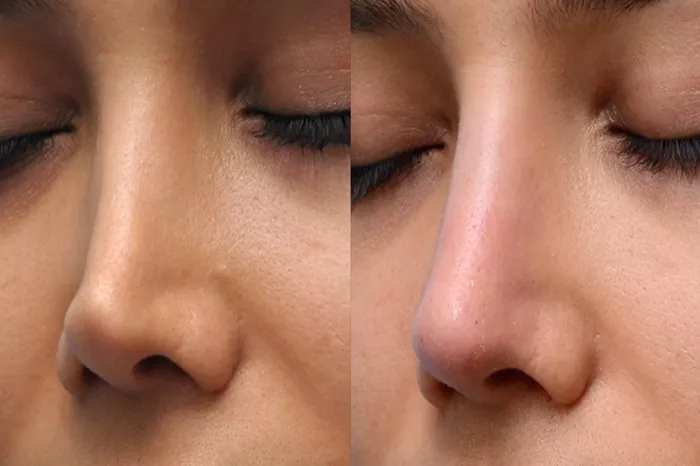Rhinoplasty, or a nose job, is a widely performed cosmetic procedure designed to reshape the nose for aesthetic or functional purposes. One common concern among patients undergoing rhinoplasty is the duration of post-operative numbness. This article explores the causes of numbness, what to expect during recovery, and strategies to manage this temporary condition effectively.
Understanding Rhinoplasty and Numbness
Overview of Rhinoplasty
Rhinoplasty is a surgical procedure aimed at modifying the nose’s shape, size, or structure. It can be performed for cosmetic enhancements or to correct functional issues, such as breathing difficulties. The surgery involves:
Incisions: Making cuts either inside the nostrils (closed rhinoplasty) or across the columella (open rhinoplasty).
Reshaping: Adjusting the nasal bones and cartilage to achieve the desired shape.
Grafting: Adding or removing tissue as needed to support the new structure.
During the procedure, the manipulation of nasal structures inevitably impacts the sensory nerves in the nose and surrounding areas.
Causes of Numbness
Post-operative numbness occurs due to the following reasons:
Trauma: The surgical process creates trauma to the nasal tissues and nerves.
Swelling: Post-surgical swelling compresses the nerves, leading to a sensation of numbness.
Healing Process: Nerve endings regenerate slowly, and the recovery of full sensation can take time.
Understanding these causes helps set realistic expectations for the recovery process.
Immediate Post-Operative Period
Early Recovery (First Few Days)
In the initial days after rhinoplasty, patients typically experience:
Significant Swelling: Swelling around the nose and eyes can be substantial, contributing to a feeling of numbness.
Bruising: Bruising in the surrounding areas can also affect sensation.
Discomfort: Some degree of discomfort or sensitivity is normal.
During this time, the numbness is usually most intense in the tip and bridge of the nose, where the most surgical manipulation occurs.
Duration of Numbness in Early Recovery
The immediate post-operative numbness generally follows this timeline:
0-3 Days: Numbness is usually at its peak due to swelling and surgical trauma.
3-7 Days: The severity of numbness begins to decrease as the swelling starts to subside.
Patients should be prepared for this phase by managing their expectations and following post-operative care instructions closely.
Short-Term Recovery (1-3 Months)
Managing Numbness
During the first few weeks to months, the following strategies can help manage numbness:
Follow Post-Operative Instructions: Adhere to your surgeon’s care guidelines, which may include:
Medications: Take prescribed medications as directed to manage pain and swelling.
Avoid Pressure: Refrain from pressing or applying pressure to the nose.
Gentle Nasal Care: If recommended by your surgeon, engage in gentle nasal massages to promote circulation and nerve recovery.
Expected Timeline for Short-Term Recovery
1 Week: Many patients notice that the intensity of numbness starts to decrease.
2-4 Weeks: Sensitivity may begin to return in areas closest to the skin’s surface.
1-3 Months: Significant improvement in sensation is common, although some numbness might persist in certain areas.
Understanding this timeline helps in managing expectations and preparing for ongoing recovery.
See also: How To Make Your Nose Bridge Smaller Naturally?
Long-Term Recovery (3 Months to 1 Year)
Persistent Numbness
In the months following surgery, some patients may continue to experience:
Residual Numbness: Mild numbness or altered sensation that persists in specific areas.
Gradual Improvement: Sensation generally continues to improve, though it may take up to a year for complete resolution.
Factors Affecting Numbness Duration
Several factors can influence how long numbness persists:
Surgical Technique: The extent of manipulation and the specific techniques used during surgery can affect nerve recovery.
Individual Healing: Each patient’s healing process is unique, influenced by:
Age: Older patients may experience slower nerve regeneration.
Health Status: Overall health and medical conditions can impact healing.
Previous Conditions: Prior nasal conditions or surgeries can affect recovery timelines.
Self-Care for Long-Term Recovery
Regular Follow-Ups: Attend all scheduled follow-up appointments to monitor progress and address any issues.
Patience: Understand that full sensory recovery can take time, and follow your surgeon’s advice to support the healing process.
Managing Expectations and Recovery
Communication with Your Surgeon
Maintaining open communication with your surgeon is crucial. This includes:
Discussing Concerns: Address any concerns about the duration or intensity of numbness.
Personalized Advice: Receive tailored advice on managing numbness based on your specific situation.
Follow-Up Care
Follow-up appointments allow for:
Progress Monitoring: Assessing the healing progress and making necessary adjustments to care plans.
Addressing Issues: Identifying and addressing any complications or persistent symptoms.
Self-Care Tips
Avoid Trauma: Minimize activities that could impact your nose.
Stay Hydrated: Proper hydration supports overall healing and can help reduce swelling.
Healthy Diet: A balanced diet rich in vitamins and minerals supports nerve health and recovery.
Conclusion
Post-rhinoplasty numbness is a common and expected part of the recovery process. While the duration and intensity of numbness can vary, most patients experience significant improvement within the first few months. By understanding the typical recovery timeline and following appropriate care guidelines, patients can manage their expectations and support a smoother healing process.
For any ongoing or concerning symptoms, consulting with your healthcare provider ensures that your recovery is on track and helps address any issues promptly.
Related topics:
8 Questions to Ask Before Your Rhinoplasty
How Long Do You Have To Wait For Revision Rhinoplasty?
Top 10 Foods To Eat After Rhinoplasty


